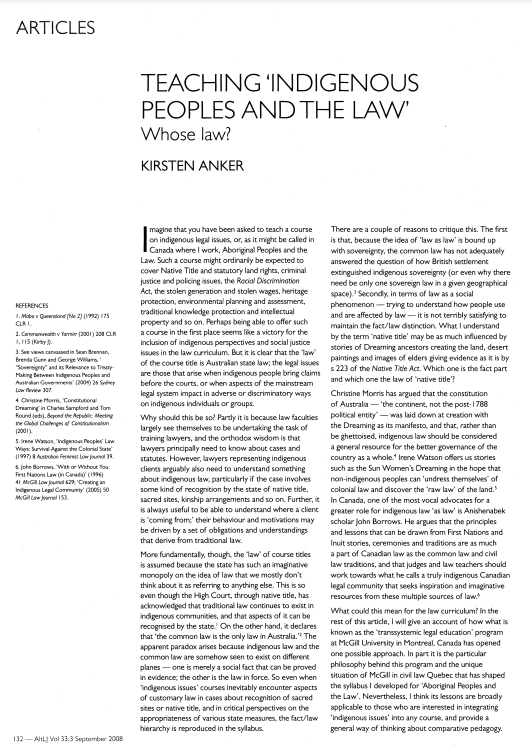External Resources
United Nations Declaration on the Rights of Indigenous Peoples
The UN Declaration recognizes Indigenous peoples’ right of self-determination and affirms that they must have the authority to act in full and equal partnership with states. It also affirms Indigenous peoples’ right to redress in cases where their lands have been taken, used, or damaged without their “free, prior and informed consent” and that states must provide effective mechanisms for such redress, giving due authority and recognition to Indigenous peoples’ laws.
Truth and Reconciliation Commission’s “Calls to Action”
The “Calls to Action” of the Truth and Reconciliation Commission recommend that Canada “adopt and implement the UN Declaration on the Rights of Indigenous Peoples as a framework for reconciliation.” Further, the TRC recommends that Indigenous laws and legal traditions be recognized and integrated in “processes involving Treaties, land claims, and other constructive agreements.”
Testify: A Project of the Indigenous Laws + The Arts Collective
The Testify project creates opportunities for dialogue between artists and legal theorists about Indigenous laws and opportunities for their dynamic and live expression as part of Canadian society. Art and Law are areas that have tremendous impact and influence on our lives. Art is a force that has the ability to access the heart and soul in a visceral way. Indigenous Laws combine both: often the strongest and most enduring expression of Indigenous Laws is through art: dance, storytelling, sculpture, song, paintings.
University of Victoria Indigenous Law Research Unit (ILRU)
The Indigenous Law Research Unit (ILRU) is a dedicated research unit at the University of Victoria’s Faculty of Law committed to the recovery and renaissance of Indigenous laws. We believe Indigenous laws need to be taken seriously as laws. We partner with and support work by Indigenous peoples and communities to ascertain and articulate their own legal principles and processes, in order to effectively respond to today's complex challenges.
This paper addresses how, in practical terms, to effect the recognition of Indigenous laws in the practice of Canadian law. Chief Justice Finch asks: “How can we, as practitioners and as a society, make space within the legal landscape for Indigenous legal orders?” He explains the ways in which non-Indigenous legal practitioners need to practice “humility, respect and receptivity” in “individual and collective approaches to Indigenous laws.”
“A Duty To Act” Remarks of the Honourable Robert J. Bauman, Chief Justice of British Columbia
Building off of the paper “The Duty to Learn,” by Chief Justice Lance Finch, these remarks give urgency to the duty to act by finding space for Indigenous legal orders within the current legal system, but more than that, by prioritizing and centering and honouring Indigenous perspectives in the legal system. He ends by saying “Listen to the real stories of those Indigenous persons who stand before the court, who live by Indigenous law. Listen to Indigenous writers and researcher who have expert knowledge and lived experience of Indigenous culture. Listen to the counter-stories. Listen, question, recognize the truth, and act.”
Teaching "Indigenous Peoples and the Law’” by Kirsten Anker
Law faculty courses on indigenous legal issues tend to assume that "the law" to be studied is the law of court cases and statutes. If indigenous law comes into the picture, it is frequently only in relation to establishing claims within state law, or critiquing the sufficiency of policy, legislation and judicial decisions. Using the unique transsystemic approach to legal education championed by McGill University Faculty of Law as a starting point, this article explores what it might mean to take indigenous law seriously in the law curriculum.
The Land is the Source of Law brings an inter-jurisdictional dimension to the field of indigenous jurisprudence: comparing Indigenous legal regimes in New Zealand, the USA and Australia, it offers a 'dialogical encounter with an Indigenous jurisprudence' in which individuals are characterised by their rights and responsibilities into the Land.
As Part of its ongoing efforts to secure the recognition of Indigenous laws in the resolution of specific claims, the AFN held its second annual Indigenous Laws Gathering in Huron Wendat territory in Wendake, Quebec. The gathering provided an opportunity for knowledge keepers, First Nations leadership, community members, academics, and legal experts to share perspectives on the recognition of Indigenous laws in claims resolution and in the creation of institutions.










